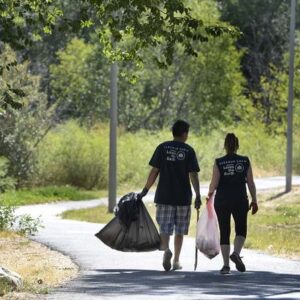
Quality of Life
The Honors Think Tank on Quality of Life spent the academic year exploring basic assumptions about contemporary life, examining the meanings of happiness, productivity, success, and other key ideals that guide our lives. On a broader level, they looked at indicators of well-being, making cross-national comparisons, and analyzed the design of neighborhoods and communities. This Think Tank Team spent a great deal of time outside of the classroom, visiting Wasatch Commons co-housing and the new Daybreak project, and documenting interviews with refugees through the International Rescue Committee.
After investigating the issue of pace of life in contemporary society, the Think Tank decided to produce a free "Pace of Life Fair" for the general public at the Salt Lake City Library as their final project. Representatives from area organizations had booths dedicated to addressing the important practical implications of the topic, including its historical, philosophical, and cultural aspects. The fair explored questions about quality of life such as: What are the main contributors to an increased pace of life today? What roles do transportation and commuting play? How do changing values, expectations, and habits figure into this? What about economic pressures? What are the effects on relationships? On home life? On participation in the community? On ethics?
Leading experts participated in panel discussions on work and commuting, health and well-being, and education and family. The highlight of the fair was a keynote address by John de Graaf, nationally recognized author and documentary film producer, who coordinates the national Take Back Your Time movement. His lecture, "America's Time Famine: Causes, Consequences and Cures;' explained how we can change our lifestyles to regain control of our time. The fair also featured a screening of the film "Running Out of Time:'
Instructors:
Sally Planalp
George Cheney
More Praxis Labs

Overworked, Underpaid, and Burned Out: How Work Sustains Health Inequities
Emily Ahonen
Camie Schafer
Reimagine the role of work in shaping health, equity, and justice—while exploring how we might build a better future.

Psychedelics & Mental Health
Tomas Melicher
Amanda Stoeckel
Examine the science, ethics, and applications of psychedelics in mental health—culminating in student-led, community-focused projects.

Environmental Exposure & Health: Analyzing Estimates through Artificial Intelligence
Daniel Mendoza
Simon Brewer
Use Salt Lake City as your lab to explore how AI and environmental data can uncover the hidden health effects of air quality and climate.
